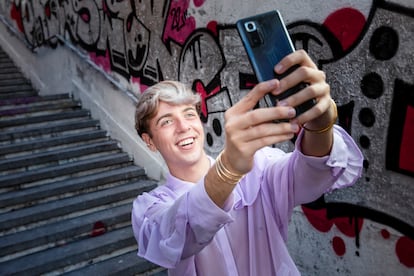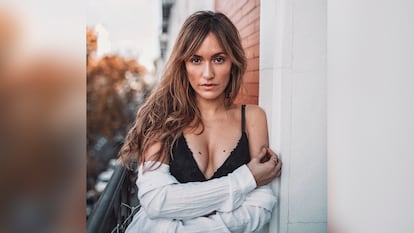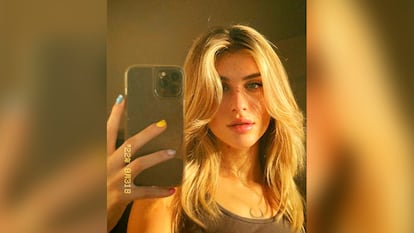The dangers of TikTok mental health advice
Experts caution youths about heeding unprofessional information offered by social media influencers


Psychiatrists often recommend coping with trauma by sharing experiences in familiar group settings after first receiving professional help. “This type of sharing is very therapeutic,” says Ignacio Civeira, a child and adolescent psychiatrist at the behavioral addictions unit of Gregorio Marañón Hospital in Madrid. This safe setting stands in stark contrast to TikTok, which has become an unfiltered platform on which to express traumas, anxieties and fears amid a wave of mental health problems exacerbated by the pandemic. Social media influencers lie down on Dr. TikTok’s couch to share their experiences with thousands of followers. In this setting, the influencers make the rules, choose the topics and set the tone. It’s somewhat liberating and does serve the useful purpose of erasing mental health stigmas. But there are also risks. Followers may be tempted to self-diagnose based on what they see and hear on TikTok, and could start changing behaviors without professional supervision. “Younger people tend to imitate, and will copy a behavior just because a person seems interesting or attractive, even though the information is not substantiated,” warns Civeira.
Rocio Romero is a 34-year-old influencer (@roenlared) with almost 400,000 Instagram followers. Romero has been making a living on social media since 2016 from her many sponsorships. She doesn’t create specific mental health content, but often makes comical posts about everyday situations, such as the pressures facing women today. A few years ago, she talked about an eating disorder (anorexia nervosa) that started as a young girl and lasted until her mid-twenties. “We never talked about it in my family — I buried it and was afraid to discuss it on the internet because I didn’t know how to broach the subject,” said Romero. She decided to make a video with the help of her psychologist, and encouraged her followers to send questions. After just a few days, Romero received over 1,000 emails. “People really opened up after I shared the most vulnerable part of my life. I started getting questions about eating disorders, abuse, suicidal thoughts… I realized that I wasn’t equipped to handle this.”

Romero first thought about posting a follow-up video with the help of her psychologist, but then came up with a better idea. She created Caliope, an audio app focused on emotional well-being that already has 16 professional therapists (influencers like @neuronacho, @maria_esclapez and @dr.rosamolina) replying to users’ questions.
Social media can be a powerful tool for breaking down biases and challenging things that aren’t working well. Ana Belén Medialdea (@anapsicologamadrid) is a psychiatrist who creates professional social media content and has more than 41,000 Instagram followers. She has had patients come to her for therapy after seeing some of their social media contacts do the same. “One of my patients was following an account that talks about fatphobia, and one day she self-identified with this condition. She would feel shame at mealtimes, or when she ate some cake with friends. She would then force herself to exercise that same day. That’s when she decided to come to me for a consultation. We identified some warning signs such as an obsession with her body and a preference for wearing baggy clothes… we caught her just in time.”
Sara Sarmiento is a psychologist whose mental health-oriented TikTok channel has 2.1 million likes. She sees many patients who are confused or who have self-diagnosed by what they see on social media, often posted by completely unknown people. “We have to deconstruct that self-image and help them get rid of all the self-imposed labels. Lots of adolescents imagine they have a disorder when they are really just undergoing a natural process. Their personalities are still developing, and they are not suffering from any disorder. They are simply going through a stage with peaks of suffering,” said Sarmiento. She says it can be dangerous when people try to change behaviors without consulting a professional just because they became convinced that they fit a diagnosis.
Rubén Avilés is a 23-year-old TikTokker with more than 11.5 million likes who also makes a living from social media and sponsorships. Known for his LGTBQ+ activism and dry humor, Avilés once posted a startling confession. “When I was a 12-year-old pre-adolescent, I suffered from anorexia. I was considered the school faggot... and on top of that, I was the fat kid. I couldn’t take it anymore and said I’m not going to be fat anymore. I started watching what I ate and counting calories.” When his family realized what he was doing, they took him to the doctor who said, “Those problems are more typical of girls.”
@ruben.avilesx @Teresa López Cerdán gracias por ayudarme a hablar de esto, te quiero #lasvocesdeellas #gorda #gordas #lgtb #lgtbiq #opinion
♬ sonido original - Rubén Avilés
“I don’t like to talk much about my private life,” Avilés told EL PAÍS. “If I’m feeling down because I just broke up with my boyfriend, I keep it private. I keep my partner to myself. When I decided to talk about the eating disorder that I overcame years ago, it was something I first discussed with a professional. I was very worried about it because you don’t know how people or sponsors will react. Lots of people have thoughts that they express in songs. I make videos to express myself and I value the gratitude of young people who learned something from a post of mine about a problem they were afraid to bring up.”
But the aftermath of his video post proved hard to handle. Avilés began receiving hundreds of direct messages through the app from young people asking for advice. “I can’t be the personal therapist for half a million people with problems. I’m not a psychologist… I’m nobody… I have no clue about the [professional] guidelines,” he said. But a few messages moved him to reply. One 14-year-old boy’s mother wanted to take him to a psychiatrist after he told her he was gay. “Sometimes I decide to take on a responsibility, so I told him he was perfectly fine... but to involve myself in every case would be irresponsible and also detrimental to my own mental health,” said Avilés.
An Instagram pilot program
In June, Instagram launched the Collective Well-Being Project, a pilot program in the United States to train about 50 people in the “responsible” creation of content related to emotional well-being. The project is led by a committee of independent health professionals. Now, when a user searches for content related to eating disorders or suicide, a tab automatically pops up with information and ways to contact organizations with specific expertise. “We do not allow content promoting self-harm and eating disorders. We remove it as soon as we detect it,” said Instagram.
In Spain, suicide was the second leading cause of death after cancer among young people ages 15 to 29 in 2020. The same year saw a record number of children under 15 taking their own lives. In September 2022, Spain’s Ministry of Public Health will hire 20 medical resident interns in the field of child and adolescent psychiatry.
TikTok has also implemented some measures to combat the problem. When a user searches for suicidal behavior content, the app displays information about suicide prevention helplines. TikTok has more than a billion users worldwide, 33% of which are younger than 25.

When @_samantha (300,000 Instagram followers) became a contestant on Operación Triunfo 2020, a Spanish reality television music competition, she decided to tell her fans that she was having panic attacks because she wanted to destigmatize mental health issues. “It was definitely clickbait … we were in the middle of the program, and I uploaded a photo of myself smiling with some text saying that I wasn’t well. It got over 5,000 mostly supportive comments.” Samantha had her first panic attack when she was 21. “I didn’t feel comfortable with anyone, even with my mother once. We were shopping and I just looked at her and started to have the panic attack. I knew I had to see a psychologist, but I didn’t say anything. I’ve been seeing a therapist for seven years and knew that it was time to talk openly about this condition that I still have. Not everything is a party on Instagram — if something’s wrong, you should say something.”
Katherine Keyes is an epidemiologist who researches adolescent suicide at Columbia University (New York). She believes that young people who are having interpersonal conflicts, clashes with family and friends, and who may be socially excluded or marginalized are very susceptible to misinformation on social media. According to psychiatrist Ignacio Civeira, these vulnerable young people have more difficulty absorbing the non-stop content suggestions from the social media algorithms. “If I say on Instagram that chocolate with 90% cocoa causes schizophrenia, people with fewer resources will have more trouble filtering, comparing and validating the information.”
Claudia Pradas (@claudiap_psicologia), a psychologist with 17.5 million likes on TikTok, says that one of the biggest problems is that people confuse anecdotes with diagnostic criteria. “People will believe that mistakenly picking up a fork instead of a knife is a symptom of ADHD (attention deficit hyperactivity disorder) just because the same thing happened to an influencer.” Pradas is part of a new wave of psychologists creating mental health content for social media, and believes that younger people turn to social media for help because they have been hurt by the attitudes of parents and grandparents who had no emotional education. The turning point came with the pandemic, which led young people to share their pain. “I try to get closer to them by sharing personal stories like the bullying I endured in high school — I was the geek with no friends. I try and show that this is a safe place for them.” The hashtag #saludmental (#mentalhealth) on TikTok has more than 8.4 billion views.
Tu suscripción se está usando en otro dispositivo
¿Quieres añadir otro usuario a tu suscripción?
Si continúas leyendo en este dispositivo, no se podrá leer en el otro.
FlechaTu suscripción se está usando en otro dispositivo y solo puedes acceder a EL PAÍS desde un dispositivo a la vez.
Si quieres compartir tu cuenta, cambia tu suscripción a la modalidad Premium, así podrás añadir otro usuario. Cada uno accederá con su propia cuenta de email, lo que os permitirá personalizar vuestra experiencia en EL PAÍS.
¿Tienes una suscripción de empresa? Accede aquí para contratar más cuentas.
En el caso de no saber quién está usando tu cuenta, te recomendamos cambiar tu contraseña aquí.
Si decides continuar compartiendo tu cuenta, este mensaje se mostrará en tu dispositivo y en el de la otra persona que está usando tu cuenta de forma indefinida, afectando a tu experiencia de lectura. Puedes consultar aquí los términos y condiciones de la suscripción digital.








































